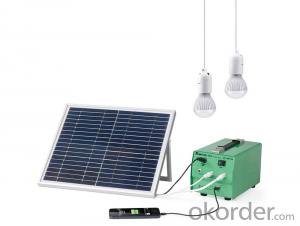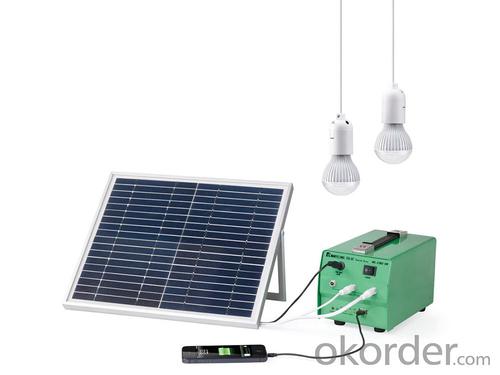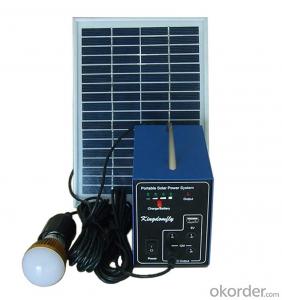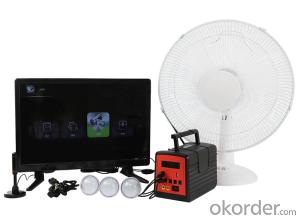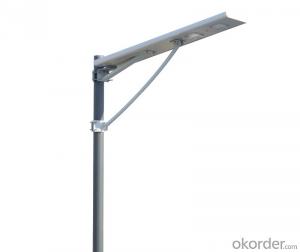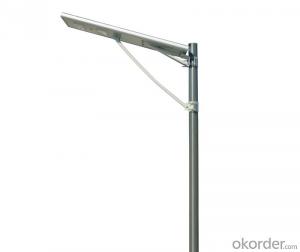Active Solar Energy Systems - 5W Solar Lighting System with Integrated Power Box
- Loading Port:
- Guangzhou
- Payment Terms:
- TT OR LC
- Min Order Qty:
- 50 set
- Supply Capability:
- 10000 set/month
OKorder Service Pledge
OKorder Financial Service
You Might Also Like
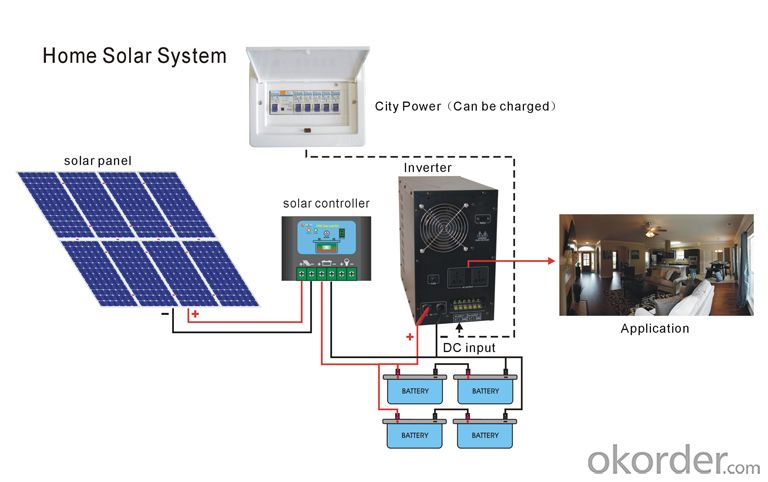
Features:
1. Solar panel : crystalline silicon 3W, efficiency>=16%;
2. Plug & Play Integrated Power Box: 1 pc (Built-in controller 3A/12V and maintenance-free lead-acid battery 4.5AH/12V),and within 1.5W led lamp ;
3. LED lamp sets: 1pcs. (1W/5V, 5m wires with on/off switch);
4. Charing cable : 1 x USB cable 10-in-1;
5. Charging time: An empty battery full charged about 6 hours under full sun. A full battery supports 2 LED lamps 8 hours;
6. Warranty: Panel 10 years; Battery 1 year; others 1 year.
| Item number | XT902-5W |
| Solar panel | Poly crystalline 5W |
| Battery | lead-acid battery 4.5AH/12V |
| LED lamp | 1.5watt, >50000 hours |
| cable of led lamp | 5 m |
| Weight | 3.5kg/set |
| Output | DC 12V and DC 5V |
| Working Time @ full battery | 2 LED lamps totally using 8hours. |
| Warranty | 1 years |
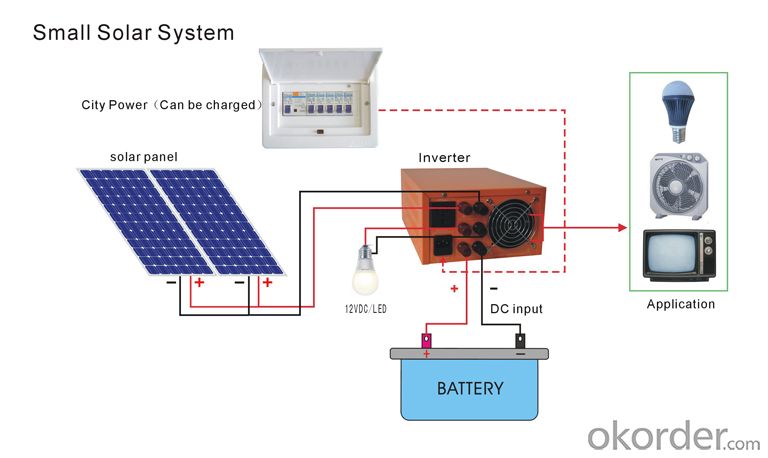
Quantuty
Quality goal:Constant innovation to meet the request of the customers. Protect the environment, provide environmental products to customer.
Quality strategy:
Quality: established high efficiency quality manager system in line with ISO9001 and ISO/TS16949.
Improvement: keeping improvement & quality guarantee.
Efficiency: delivery on time, complete the agreed events with the customers on time.
Service: focus on customers, provide the service and technology support on time.
FAQ
1. How long will my inquiry get response?
Your inquiry related to our products or prices will be replied within 24 hours.
2. Can I get professional service and suggestion?
Well-trained and experienced staffs to answer all your questions in fluent English.
3. Do you accept OEM or customized design?
OEM & ODM, any your customized lightings we can help you to design and put into product.
4. What if I need specific design?
Distributorship are offered for your unique design and some our current models.
- Q: Can solar panels be used in military operations or remote military outposts?
- Yes, solar panels can be used in military operations or remote military outposts. They provide a reliable and sustainable source of energy, reducing dependence on fuel supply lines and minimizing the environmental impact. Solar panels can be easily integrated into various military systems, providing power for communication equipment, surveillance systems, and other essential devices. Additionally, their portability and ability to operate in remote locations make them a practical solution for military operations and outposts where access to traditional power sources may be limited.
- Q: What is the role of a solar energy system installer?
- The role of a solar energy system installer is to design, install, and maintain solar energy systems for residential, commercial, and industrial properties. They assess the site, conduct energy audits, determine the system size and components needed, and then install the solar panels, inverters, and other equipment. Additionally, they ensure proper electrical connections, perform system testing, and provide customer education on system operation and maintenance.
- Q: Can solar energy systems be used for powering electric vehicle charging infrastructure?
- Certainly, solar energy systems can be utilized to power electric vehicle (EV) charging infrastructure. Solar power, as a clean and renewable energy source, can be harnessed through the utilization of photovoltaic (PV) panels. These panels can be installed on various surfaces such as rooftops, carports, or open fields, and their function is to convert sunlight into electricity. The electricity generated by solar panels can serve two purposes: directly charging EVs or powering the EV charging infrastructure, which includes charging stations, grid-tied DC fast chargers, or battery storage systems. By employing solar power for EV charging, we can make substantial reductions in greenhouse gas emissions and decrease our reliance on fossil fuels. Solar-powered EV charging infrastructure offers numerous advantages. Firstly, it aids in the reduction of the carbon footprint associated with transportation by utilizing clean energy instead of relying on grid electricity, which often originates from fossil fuel sources. Secondly, it allows for decentralized energy production, enabling EV owners to charge their vehicles using on-site renewable energy. This eases the burden on the electric grid and promotes energy independence. Moreover, solar EV charging infrastructure can be combined with energy storage systems, such as batteries. This enables excess solar energy generated during the day to be stored and used for EV charging during the night or when sunlight is unavailable. Battery storage also helps manage peak demand and ensures a more stable and reliable power supply for the charging infrastructure. The implementation of solar-powered EV charging infrastructure is a global trend that is gaining momentum. Both public and private entities are installing solar panels at charging stations, parking lots, and highways, providing sustainable and cost-effective charging options for EV owners. Additionally, government incentives and subsidies are often available to encourage the adoption of solar energy and EVs. In conclusion, solar energy systems can be effectively utilized to power electric vehicle charging infrastructure. This combination offers a sustainable and clean solution for transportation, reduces carbon emissions, and promotes energy independence.
- Q: Can solar energy systems be used for powering off-grid eco-hospitals?
- Yes, solar energy systems can be effectively used for powering off-grid eco-hospitals. Solar panels can be installed to harness and convert sunlight into electricity, providing a sustainable and renewable source of power. This can help reduce dependency on traditional energy sources and mitigate the environmental impact of hospitals. Additionally, solar energy systems can be combined with battery storage solutions to ensure a continuous power supply even during periods of low sunlight or at night. This makes solar energy an ideal choice for off-grid eco-hospitals, promoting both environmental sustainability and energy independence.
- Q: Can solar energy systems be used in areas with limited access to solar energy conferences and expos?
- Yes, solar energy systems can definitely be used in areas with limited access to solar energy conferences and expos. The availability of conferences and expos may provide valuable information and networking opportunities, but they are not essential for the successful implementation and usage of solar energy systems. With the right resources and expertise, communities and individuals can still benefit from solar energy systems, even without direct exposure to conferences and expos.
- Q: Can solar energy systems be used for powering electric train systems?
- Electric train systems can be powered using solar energy systems. Photovoltaic (PV) panels or concentrated solar power (CSP) systems can convert solar energy into electricity, eliminating the need for fossil fuel engines. The feasibility of solar energy for trains depends on factors like sunlight availability, panel size and efficiency, and energy requirements. For example, regions with abundant sunlight, like deserts, can effectively harness solar energy for trains. Solar-powered train systems already exist globally. The Byron Bay Train in Australia relies solely on a solar train system with panels and battery storage. In India, a railway line section is powered by solar energy, providing sustainable transportation. Implementing solar energy systems for electric trains brings numerous benefits. It reduces dependence on fossil fuels, lowering greenhouse gas emissions and combating climate change. Solar energy is renewable, offering a sustainable long-term solution. Additionally, solar-powered trains have lower operating costs due to reduced maintenance and stable fuel prices. However, challenges exist with solar energy for train systems. Initial installation costs can be high, but long-term savings outweigh the investment. Sunlight intermittency is also a challenge, especially during cloudy or nighttime conditions. This can be resolved using battery storage systems that store excess energy for later use. In conclusion, solar energy systems are viable for powering electric train systems. Advancements in solar technology and the need for sustainable transportation position solar-powered trains as a significant factor in the future of rail transportation, promoting clean energy and reducing environmental impact.
- Q: Can solar energy systems be used for powering electric vehicle autonomous driving systems?
- Yes, solar energy systems can be used to power electric vehicle autonomous driving systems. Solar panels can be installed on the roof or other surfaces of the vehicle to capture sunlight and convert it into electricity. This electricity can then be used to charge the vehicle's battery, which in turn powers the autonomous driving systems. However, the energy generated from solar panels may not be sufficient to solely power the autonomous driving systems, and additional sources of power or energy storage may be required for optimal functionality.
- Q: Are there any fire safety concerns associated with solar energy systems?
- Solar energy systems have been found to have fire safety concerns. Although they are generally considered safe and reliable, there have been instances where these systems have caused fires. One concern regarding fire safety is associated with the improper installation or maintenance of solar panels. If the panels are not installed correctly, there is a possibility of electrical faults or short circuits, which can lead to overheating and potentially result in fires. Similarly, if the system is not regularly inspected and maintained, it can increase the likelihood of electrical failures and subsequent fires. Another concern is related to the electrical wiring and connections of the solar energy system. Faulty wiring or loose connections can generate heat and potentially cause electrical fires. This is particularly relevant in older systems where the wiring may have deteriorated over time. Furthermore, firefighters may encounter additional challenges when dealing with buildings equipped with solar energy systems during a fire incident. The presence of live electricity generated by the panels can pose a risk to firefighters, making it more difficult to safely extinguish the fire. To address these fire safety concerns, it is crucial to have qualified professionals install solar energy systems in accordance with the necessary codes and regulations. Regular inspections and maintenance should also be carried out to promptly identify and resolve any potential issues. Additionally, proper training should be provided to firefighters on how to handle fires involving solar energy systems in order to minimize risks.
- Q: How do solar energy systems impact the health and well-being of communities?
- Solar energy systems have a positive impact on the health and well-being of communities in several ways. Firstly, they significantly reduce air pollution by replacing fossil fuel-based energy sources, leading to cleaner air and a decrease in respiratory diseases. Secondly, solar energy systems eliminate the need for hazardous materials like coal and oil, reducing the risks associated with mining and transportation accidents. Moreover, the increased availability of affordable and sustainable energy promotes economic development, improves access to healthcare, and enhances overall quality of life. Additionally, solar power generation creates job opportunities, contributing to the socio-economic well-being of communities. In summary, solar energy systems have a profound positive effect on community health, environmental sustainability, and overall well-being.
- Q: Can solar energy systems be used in powering music studios or recording studios?
- Yes, solar energy systems can definitely be used to power music studios or recording studios. Solar power systems are a clean and renewable energy source that can provide a reliable and cost-effective solution for powering various electrical equipment, including the high energy-consuming equipment found in music studios. Solar panels can be installed on the roof or any other suitable area of the studio building to harness sunlight and convert it into electricity. This electricity can then be used to power a wide range of equipment such as amplifiers, mixers, microphones, computers, lighting, and air conditioning systems. The size of the solar power system required will depend on the energy needs of the studio. By analyzing the energy consumption patterns and demands of the studio, solar energy experts can design and install a customized solar power system to meet the specific requirements of the studio. One of the advantages of using solar energy in music studios is the potential for significant cost savings. Traditional electricity sources, especially in commercial settings, can be quite expensive. By generating their own electricity through solar power, studios can reduce their reliance on the grid and potentially lower their electricity bills. Additionally, solar energy is a sustainable and environmentally friendly option. Music studios often consume a large amount of electricity, and using solar power can help reduce their carbon footprint and contribute to a greener future. It is worth noting that solar energy systems can also be combined with battery storage systems. This allows music studios to store excess energy produced during the day and use it during times of low solar generation or at night. This further enhances the reliability and independence of the solar power system. In conclusion, solar energy systems can be effectively used to power music studios or recording studios. They offer a clean, renewable, and cost-effective solution that can meet the energy demands of these facilities while reducing their environmental impact.
Send your message to us
Active Solar Energy Systems - 5W Solar Lighting System with Integrated Power Box
- Loading Port:
- Guangzhou
- Payment Terms:
- TT OR LC
- Min Order Qty:
- 50 set
- Supply Capability:
- 10000 set/month
OKorder Service Pledge
OKorder Financial Service
Similar products
Hot products
Hot Searches
Related keywords
